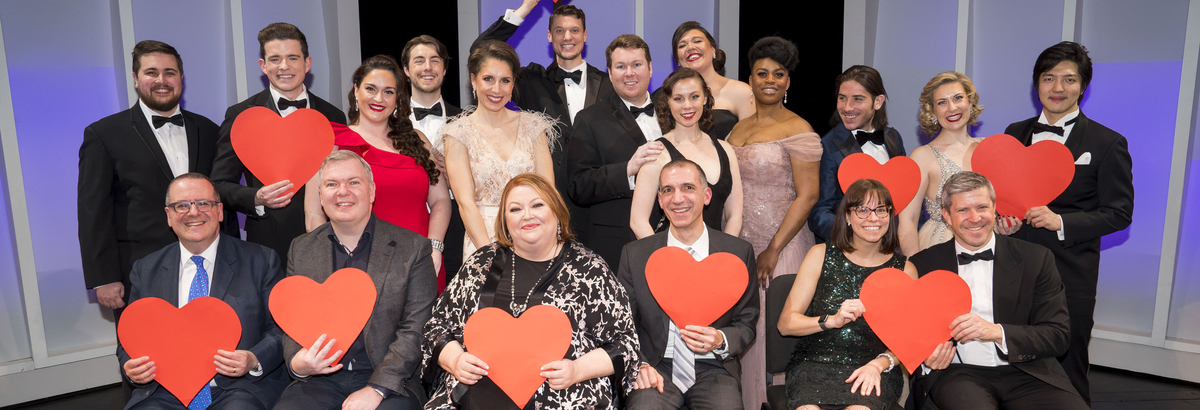April 17, 2019
Master Mentor: Julia Faulkner
Julia Faulkner adores beautiful, interpretively meaningful, technically accomplished singing. The American soprano was known for giving audiences exactly that on major stages during an outstandingly successful international career. Today a new generation of singers is benefiting from Faulkner’s knowledge and experience at Lyric’s renowned artist-development program, The Patrick G. and Shirley W. Ryan Opera Center, where she is director of vocal studies.
Faulkner also teaches at Philadelphia’s Curtis Institute of Music and at other prestigious programs for young singers, including those of The Santa Fe Opera and the Aldeburgh Festival. She also completed a residency in London with the artists of both the Jette Parker (Royal Opera House) and Harewood (English National Opera) Young Artist programs. In the past several years, her students have been finalists in several of the world’s most prestigious vocal competitions, and she works with many stars of the world’s major houses.
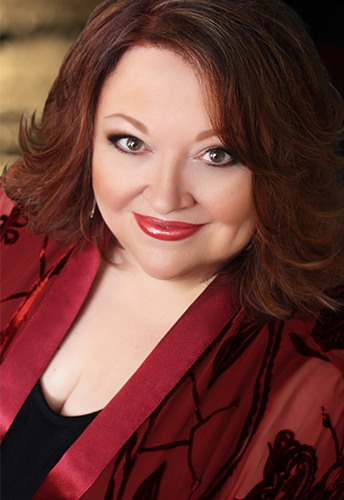
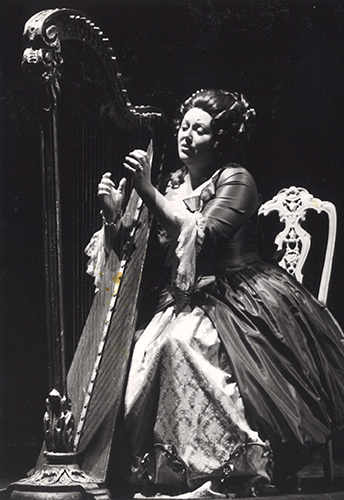
Julia Faulkner as the Countess in Capriccio, Bavarian State Opera (Munich)
The self-described “Wisconsin girl” grew up with parents who encouraged her involvement in the performing arts (Faulkner’s mother was a singer, her father a professor who founded the University of Wisconsin-Stevens Point theater arts department). She started with children’s theater and, by age 12, she was in summer-stock productions learning stagecraft. Hearing something special in her singing voice, her father brought her to a local teacher, for whom she auditioned with the ballad “Moon River.” She eventually fell in love with classical repertoire, “and once I found that I sang it well, it just seemed natural to go to school and study it.” She did so at Indiana University. Her mentor there – as for so many other successful singers – was Wagner soprano Margaret Harshaw, at that time one of America's most formidable voice teachers.
Early on, Faulkner discovered her own gift for teaching. After two semesters on the Northern Arizona University faculty, she got a tenure-track position at Iowa State, “but something in me said, ‘Sing for the Met Auditions and see what happens.’” She was a national winner in the 1985 competition. “When I came back to my dressing room, there were ten agents’ cards on my table. The next day I had signed with one!” Within barely a year she’d made her European debut, singing Mozart’s La finta giardiniera in Lyon. Choosing to build her career initially in supporting roles, the young soprano accepted an ensemble position at Munich’s Bavarian State Opera, “where I knew I’d be around the greatest singers on the planet.” She discovered her core repertoire when the house assigned her 16 (!) roles in challenging operas by Richard Strauss to learn in one year (“It was amazing and life-changing”). In both Munich and Vienna, Faulkner triumphed in Strauss’s Capriccio, Ariadne auf Naxos, Arabella, and Der Rosenkavalier, scoring great successes in Mozart as well. Her career path came full circle in 1994, when she returned to the Met to star as Arabella in her company debut.
During her UW-Madison years, Faulkner also took private students, including a soprano who, beginning at age 15, commuted from Milwaukee for lessons. Emily Pogorelc got accepted into the Ryan Opera Center in 2018, coming full circle with Faulkner as her vocal coach again. In 2019, Pogorelc won the “Most Promising Talent” award at the inaugural Glyndebourne Opera Cup competition in England and debuted at Washington National Opera as Cunegonde in Bernstein's Candide.
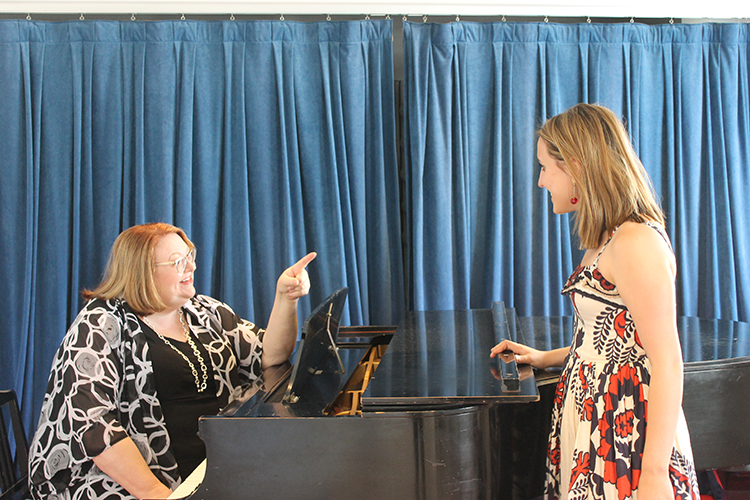
Julia Faulkner in a voice lesson with Ryan Opera Center alumna Emily Pogorelc.
“I remember being in awe of Julia,” says Pogorelc. “She was a great teacher, and also so wonderful to be around – she had amazing energy. I loved singing, but didn’t know what to do with it. Julia saw someone who was willing to learn. Her brilliance in seeing potential allowed me to develop everything I have now. I’ve found a soul mate in her. Rather than telling me what I want to hear, she tells me what I need to hear. She makes me the best person I can be. Who doesn’t want that?”
Once Faulkner’s son left home, she looked to the future, realizing that “I wanted to be around an opera house in a big city, with singers of top quality.” She already had two UW-Madison students at the Ryan Opera Center, soprano Emily Birsan and tenor James Kryshak (both are now launched on splendid international careers). Their artistry prompted the program’s administrators – director Dan Novak and music director Craig Terry – to make Faulkner’s acquaintance. Ultimately, they invited her to teach at the Ryan Opera Center starting in 2013, and appointed her director of vocal studies in 2015.
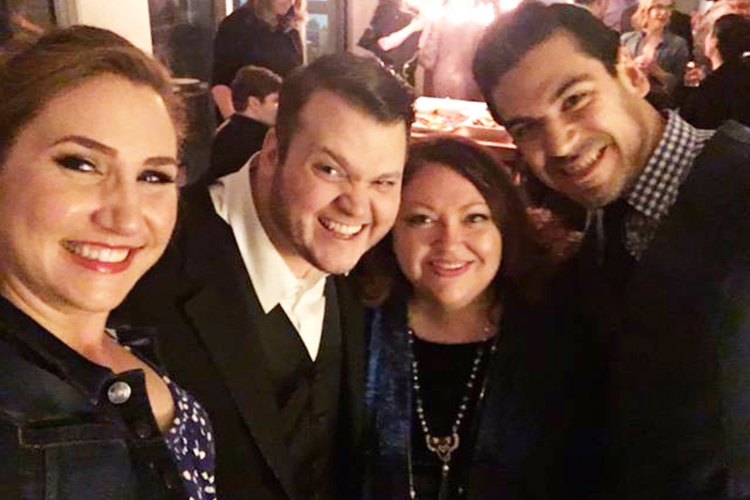
Julia Faulkner with Ryan Opera Center alumni Laura Wilde, Anthony Clark Evans, and Richard Ollarsaba.
Collaborating with Terry and Novak, Faulkner helps make major decisions regarding the singers’ activities day to day. “That was important for me when asked what I wanted in the job. The physical presence of all three of us here, seeing the singers on a daily basis, is very important.” Faulkner is also part of the decision-making panel at the final auditions. Looking at the artists she’s guided from beginning to end of their time at Lyric, "we're investing a great deal in each and every one of our artists from the moment they arrive to their final day. Our goal is for them to leave with representation and a fairly full season of engagements.”
The program’s thoroughness is exceptional. There’s extensive musical coaching, language coaching, improvisation and acting work, and sessions regarding the non-musical side of singing professionally, from financial management to proper attire. And of course, there’s the mainstage Lyric season and its challenges: everyone in the Ensemble is singing supporting roles onstage while “covering” (understudying) featured or leading ones. “It’s wonderful that they’re learning major roles while they’re here,” says Faulkner. “We do a ‘cover run’ for every show, attended by Lyric’s artistic management, so they’re in a relatively protected situation. Of course, we make absolutely sure that everyone who covers a role could step in for a performance, if needed.”
Other important performance opportunities include concerts with the Grant Park Music Festival and Civic Orchestra of Chicago; the Harris Theater's Beyond the Aria series, in which Ensemble members perform alongside Lyric stars; and the WFMT broadcast recital series, the only such series in the world, which gives singers an invaluable chance to develop the non-operatic side of their performing.
Faulkner, Novak, and Terry hear singers in scheduled auditions in New York and Chicago, but many come to their attention via their own contacts. Faulkner recalls a memory with a student from a few years ago; “My student, Michael Fabiano, was singing in San Francisco when this kid came up to him in the opera house. Michael generously heard him sing and texted me that he was great. Then Renée Fleming told us how wonderful this young tenor was. That was good enough for us!” After participating in the final auditions, Mario Rojas was invited to join the program in 2017.
In listening to auditions, the most important thing for Faulkner is that “the singer has something to say. If the voice is perfect but uninspiring, if the performance doesn’t engage me, I usually tune out.” Besides beautiful sound, “I’m listening for intelligence in their technique, and to be sure that vocal issues can be solved in a relatively short time.”
Sometimes singers’ potential will be obvious, but major changes may be necessary for them to move forward vocally. For example, alumna Laura Wilde entered the Ryan Opera Center after having just moved from mezzo to soprano. “I was in vocal transition, getting the muscles to work differently,” Wilde recalls. “Julia understood so well where my voice was going, while inching me along and keeping me sane. She’s a miracle worker.”
For Wilde, Faulkner’s expertise as a working singer with years of teaching have created “a deep, genuine caring about the young singers she’s guiding through this program. At the Ryan Opera Center, you have an administration for whom you are the priority. Julia, Craig, and Dan just want to help you succeed.”
The Ryan Opera Center singers benefit continually from working with someone who has achieved everything they want for their own careers. “Julia is able to give invaluable career advice because she had a great career,” says alumnus Anthony Clark Evans. “And when it came to my voice getting bigger, she was able to help me corral it until it became feasible for the repertoire we were aiming for—the Verdi parts.”
One of the program's most imposing voices has been that of bass Patrick Guetti. After their three years working together in Chicago, Faulkner finds most compelling “Patrick’s ability to scale down the voice’s magnificence when necessary and really show himself in his singing. In his time here, he became a consummate artist.” Guetti recently returned to Lyric in Siegfried and joined the ensemble of the renowned Deutsche Oper Berlin.
Guetti views Faulkner as “a very peaceful person – she gives you a sense of calm when you sing.” In her teaching, Faulkner is about making music, as opposed to just having well-produced tone. “She’ll say, ‘It’s technically right, but we’re here to tell a story and be part of the artistic process.’” What has always impressed Guetti is “how humble and unassuming Julia is. She comes to you with such an open heart, not this air of ‘I’ve sung at the Vienna Staatsoper.’ You walk into the room with her and you feel safe.”
When a singer is preparing for a production, Faulkner observes how it’s going, especially towards the end. “I’ll try to go to the Sitzprobe [the singers’ first rehearsal with the orchestra] and dress rehearsal. I might say, ‘You turned too far offstage and I couldn’t hear you. You have to cheat at that point.’ I love to tell them when they’ve hit the ‘sweet spots’ onstage, where the sound kind of shoots out.” Assuming technical, musical, and textual matters are totally in hand, Faulkner can then talk to singers about character “and how their vocalization enhances – or distracts – from what they want to say dramatically.”
It’s vital to Faulkner that singers have a complete idea of role preparation. For example, “you don’t just translate your part – you need to know exactly what everyone is saying all the time, even if you’re not onstage.” Faulkner encourages intellectual and artistic curiosity: “Chicago has so many offerings that can help in that regard. Theater, ballet, symphony, museums – this is the world you’re going to live in! It creates the artist within you and helps to make you a world citizen.”
The topics Faulkner and her colleagues discuss with the singers are limitless, from working with agents to conversing with donors. During Faulkner’s own student days, social media didn’t exist and “we didn’t think that much about how to market ourselves. Nowadays mass appeal is important, and there’s an incredible amount of information that you need to communicate.” Overriding everything else is simply “learning how to be a good colleague, which is so important.”
Many Ryan Opera Center singers choose to continue working with Faulkner once they leave Lyric. “Before they leave, they know they can always consider me their mentor. I’m there for them, and am thrilled to have been part of sending them out into the professional world. In what I’m doing now, I can use every aspect of my life and pass on what I know. I hope these singers will do the same one day. I think it’s so important to have a purpose in this art form, and whatever it is, we all do our part.”
—Roger Pines
Roger Pines, dramaturg of Lyric Opera of Chicago, has appeared annually on the Metropolitan Opera broadcasts’ “Opera Quiz” for the past 12 years and also contributes regularly to opera-related publications and recording companies internationally. He taught a seminar, “The Glory of Great Singing,” last spring at Chicago’s renowned Newberry Library.
